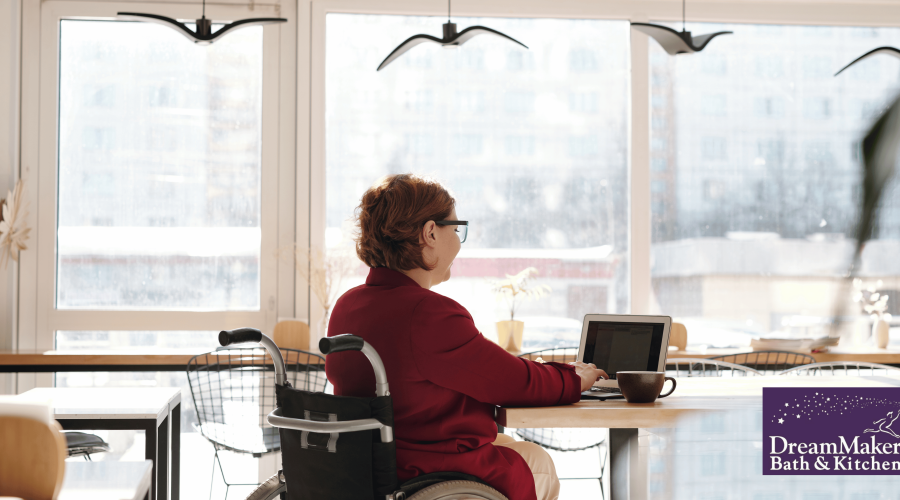
At DreamMaker Bath & Kitchen of Colorado Springs, we know that home should be a place where everyone feels comfortable, independent, and safe—no matter their mobility level. It’s not just about compliance—it’s about compassion, functionality, and creating a space that works beautifully for real life.
So, how do we design a space that’s both stylish and supportive? Let’s walk through some smart, family-friendly accessibility features that enhance life at home.
Kitchens That Work for All Abilities
The kitchen is the heart of the home—but for wheelchair users or anyone with limited mobility, a standard kitchen layout can present real challenges. We take a holistic approach to redesigning kitchens that are intuitive, easy to navigate, and genuinely enjoyable to use.
- Lowered Work Surfaces
Accessible counters should sit at 28 to 34 inches tall with open space beneath to allow for knee clearance. These lower prep areas make it possible to chop, stir, and cook from a seated position—whether in a wheelchair or simply sitting on a stool.
- Smart, Reachable Storage
Standard upper cabinets can be hard to access. We incorporate pull-down shelving, pull-out drawers, glide-around organizers, and even height-adjustable cabinetry that can move with the push of a button. Lazy Susans and deep drawers with bar handles also make the most of every inch without requiring extra effort to reach.
- Accessible Appliances
Front-control ovens, side-opening microwaves, and drawer-style dishwashers aren’t just trendy—they’re practical game-changers. Lever faucets and pull-down sprayers make using the sink easier, while induction cooktops reduce the risk of burns by staying cool to the touch around the burners.
- Clear, Wide Pathways
Maneuverability matters. A well-designed kitchen should allow for easy movement using a wheelchair, walker, or cane. We recommend pathways at least 42 inches wide and turning space of at least 60 inches in diameter to allow full rotation in a wheelchair.
Bathrooms Designed for Comfort and Dignity
The bathroom should be a place of privacy and comfort—but for those with mobility challenges, it can quickly become a hazard zone. Fortunately, thoughtful design transforms bathrooms into safe, stylish retreats.
- Curbless Showers
A level-entry or “zero-threshold” shower eliminates the tripping hazard of stepping over a curb. It’s perfect for rolling in with a wheelchair. Add a built-in bench and hand-held showerhead for extra ease and luxury.
- Comfort-Height Toilets
Standard toilets are often too low for those with joint pain or difficulty standing. Comfort-height models (typically 17–19 inches from the floor) make it easier to sit and stand safely, reducing strain on knees and hips.
- Grab Bars That Look Great
Today’s grab bars can blend beautifully into your décor. We install them near the toilet, in the shower, and by the tub—often doubling as towel bars or sleek support rails. Safety never looked so good.
- Slip-Resistant Flooring
Wet tile can be a serious hazard. We recommend textured, non-slip flooring materials for both safety and style. Secure bath mats and tactile flooring transitions also help prevent trips and slips.
- Spacious Doorways & Entry Points
The bathroom door should be at least 36 inches wide to accommodate a wheelchair. Pocket doors and barn doors can also save space while improving accessibility.
Design Features That Make a Difference Throughout the Home
Accessibility isn’t limited to kitchens and bathrooms. Whole-home design choices play a role in making every room feel welcoming and usable.
- Lighting: Bright, layered lighting reduces fall risks and makes tasks easier. Consider motion-sensor lights for hallways and under-cabinet lighting in work areas.
- Flooring Transitions: Minimize thresholds and level changes between rooms to reduce trip hazards and ease navigation with mobility devices.
- Furniture Layout: Arrange seating and furniture with wide walkways in mind. Make sure there’s enough space to turn and move freely.
- Elevator or Stair Lifts: In multi-level homes, a residential elevator or chair lift can dramatically increase independence and comfort.
Why Accessibility Benefits Everyone
Even if only one family member uses a wheelchair or walker, accessible design benefits everyone. Children, guests, and even your future self will appreciate a home that’s easy to move through and thoughtfully planned.
Beyond daily convenience, an accessible home improves:
- Safety: Reduces risk of injury for everyone.
- Independence: Helps those with disabilities complete daily tasks without assistance.
- Peace of Mind: Family members feel confident knowing their home supports every member.
- Resale Value: More home buyers are looking for inclusive design and future-ready features.
Let’s Build a More Accessible Future—Together
At DreamMaker Bath & Kitchen of Colorado Springs, we specialize in remodeling with accessibility and dignity in mind. Whether you’re modifying your kitchen, bathroom, or full home, our design experts are here to make the process smooth, thoughtful, and personalized to your needs.
Let’s start with a conversation—no pressure, just possibilities.
📞 Call us today at 719-636-2444 to schedule a consultation.
Because everyone should feel at home—and that includes every member of your family.









